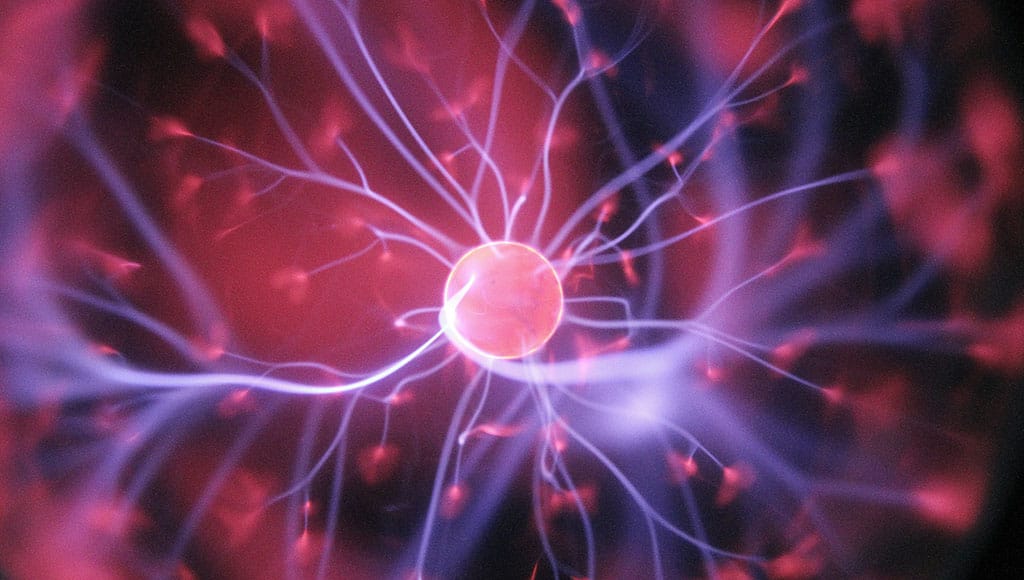Our hormonal system, also called our endocrine system, is a network of glands located throughout the body.
Hormones are chemical messengers that travel within and between the body and brain via the bloodstream; the long road to get to where they need to be. Our central nervous system includes our brain and spinal cord.
Neurotransmitters are chemical messengers that carry signals directly from cells to target cells via the nervous system; the short road. Both systems play vital roles in regulating not only our stress response system but all bodily functions, like breathing, heart rate, muscle movement, sleep, digestion and mood. One of their most important tasks is to stabilise our moods, so lucky for us dopamine, serotonin, oxytocin and endorphins are experts at creating positive feelings, happiness and pleasure for all of us. We’ll get to know all of them over the next few months, starting with dopamine, a hormone and a neurotransmitter, today.
As a hormone, dopamine slows down non-essential physiological systems, including your immune system, during stress response. As a neurotransmitter, it picks up and drops off messages throughout the body and brain that impact your behaviour, movement, cognition, thinking, coordination and pleasure. It influences your ability to think and plan, helps you focus on your challenges, work towards achieving your goals, improves your memory, mental performance and keeps you curious.
Dopamine is produced by a two-step process by which the amino acid, tyrosine, is first converted into L-dopa, then undergoes a process by enzymes that results in the production of dopamine in your brain.
It’s called the ‘feel good’ hormone because it gives you a sense of pleasure when you do what you need to do to survive; pass the test, finish the challenge, eat when you’re hungry and drink when you’re thirsty. It also motivates you to prolong this sense of pleasure by releasing large amounts of dopamine into your brain that make you feel so happy you want to repeat the behaviour to maintain the pleasurable experience.
This is why the first glass of wine leads to the fourth, why we enjoy junk food and sugar so much and why drug addiction is a real problem. The message here is, it’s ok to enjoy a dopamine boost by doing something pleasurable, but keep it balanced; if you go overboard, the dopamine rush will get you into a lot of trouble.
It’s also our ‘take risks to get rewards’ system; taking the drug is the risk, the high is the reward. Every time you indulge in the smallest to the biggest amount of pleasure, you feel the effects of the dopamine rush – the reward for creating pleasure. So, take on that challenge, set those goals and enjoy the rewards. It makes you feel good, even if you know what you’re doing is going to backfire and you’ll regret it later.
If your dopamine levels are good, you are assertive, focused, alert, motivated, cooperative, a team-player, loving, sexy and feeling attractive. If they are low, you might feel tired, fed up, unmotivated, argumentative, have mood swings, sleep problems, memory loss, low sex drive, not feel attractive, sexy or loving.
You can improve dopamine levels by focusing on a healthy lifestyle. This doesn’t mean you have to be a robot, but it does mean balance; not letting the pendulum swing too far left or right, doing your best to stay somewhere around the middle. It also means resolving your stressors as you experience them and not allowing your acute stressors to evolve into chronic stressors. Keeping dopamine levels balanced will help a lot in this process.
The building blocks of dopamine production are magnesium and tyrosine, and eating a diet high in magnesium and tyrosine is highly recommended; these are absorbed in your body, then converted into dopamine in your brain. Eating the following foods will increase your tyrosine levels:
Protein-Rich Foods: Beef, pork, lamb, and poultry; fish, especially high-protein varieties like salmon, tuna, and trout; eggs, both whites and yolks, with slightly higher concentrations found in the egg whites.
Dairy Products: Yogurt and cheese; Swiss, cheddar and mozzarella.
Plant-Based Foods: Soy products; tofu and tempeh made from soybeans are good sources of tyrosine for vegetarians and vegans.
Nuts and seeds: Almonds, peanuts, pumpkin seeds, and sesame seeds. Legumes: Beans, lentils, and peas.
Whole Grains: Quinoa, oats and oatmeal.
Darker Colored Fruits: Avocados are rich in various nutrients, including tyrosine.
If you haven’t already, try including some of these foods in your daily diet to ensure a good supply of dopamine, to balance your physical and mental health.
We can get a dopamine boost whenever we want by simply doing pleasurable things. The following are a few suggestions:
- Taking a shower is necessary and a dopamine boost.
- Plan the challenge, set your goal and enjoy your rewards.
- Alcohol and drugs may make you feel good, but the reward may not. Dopamine is not always your best friend; excessive drug and alcohol use will gradually diminish dopamine levels. A dopamine-deficit is similar to clinical depression.
- Exercise; this is any exercise at any level. To get a real benefit, accelerate your heartbeat so your heart works harder. This boosts mood, lowers stress response levels and improves cognitive functions like memory, focus and problem solving. It’s always better to do the work for the reward; releasing dopamine and raising levels through exercise that slowly increases levels during the activity and remain elevated after the activity.
- Meditation; your brain releases more dopamine when you meditate.
- Listening to music not only increases cognitive functions but also triggers the release of dopamine that relieves symptoms of anxiety and stress response. Classical music is recommended for the most pleasurable results.
Everything begins and ends with a healthy lifestyle that includes pleasurable activities. Some of us never realise that what we do keeps others happy, not us. It is very important you know what makes you happy and gives you pleasure.
By Joan Maycock
Joan Maycock MSc Health Psychologist specialised in stress and burnout education, designing, setting up and presenting Stress and Burnout Educational Retreats, Workshops and 1 on 1 sessions for private and corporate groups in Ireland and Portugal.
Tel: 00 351 915 793 592 | Email: eirinnretreats@gmail.com



















